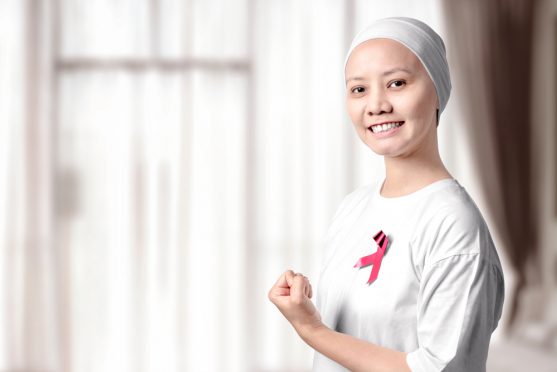So, you’ve been diagnosed with cancer. Yes, it’s not an easy situation to deal with. It can change the course of your life and affect your future in many ways.
Some who receive this diagnosis struggle to accept it and respond to it in ways that do not help them in the long run. Isolating themselves, refusing treatment, feeling depressed, guilty or helpless are common reactions to receiving a cancer diagnosis.
However, an increasing number of people are able to complete their cancer treatment successfully and move towards a better quality of life in a matter of months.
In this blog post, we look at what steps you can take to face your diagnosis in a better way and move forwards towards your treatment with a better mindset.

Step 1: Rethink your attitude to cancer
What others will think about your diagnosis is often secondary to how you feel about it yourself.
In the past, you may have heard of or known others who suffered from cancer. Their journey may or may not have ended in recovery. This information may influence how you feel about your own diagnosis.
Take the time to consider your thoughts about cancer. Separate the factual thoughts from opinions.
Today, cancer has much better treatment options than it did a few years back. Medicine and technology used in cancer care has improved drastically, improving the survival rate and the quality of life after treatment.
If you feel that there is no life after a cancer diagnosis, you may want to check the facts to correct this perception.
Gradually moving towards a positive mindset about cancer, will help you start your treatment in much better mental and physical health.
Speaking to cancer survivors might help you change your perception. You can join our Facebook group to find survivors who are willing to share their experience with you.
Step 2: Figuring out the financial aspect
In India, where health or cancer insurance are not yet very common, the first thought that crosses your mind after your diagnosis is the financial aspect of the treatment.
If you are self-employed or employed in an unorganised sector, cancer treatment may disrupt your income pattern temporarily.
There is a common perception that cancer treatment is extremely expensive. However, there are ways to reduce this cost if you have access to the right information.
The first thing to do is to have a positive mindset that is willing to figure out a solution to the problem at hand, rather than giving up all hope.

Medical loans, subsidised treatment services, buying medication from wholesale suppliers and several other such options can reduce your treatment costs to some extent. You can call Onco.com’s care managers on 79965 79965 to get free advice on the options available for you.
You can read more about managing cancer expenses here.
Step 3: Find out as much as possible about your cancer
Have a detailed discussion with your medical team about your diagnosis. Here are some questions you can ask them:
- What is my type of cancer? Which organs have been affected?
- What stage is the cancer in?
- What is the treatment going to be?
- How long will the treatment last?
- What side-effects can I expect during the treatment?
- Can I continue to work, study, and meet my friends during this time?
- What sort of diet do I need to follow?
- What type of fitness routine would be good for me?
- Who can I call in case of an emergency?
- Can I email/whatsapp someone in the medical team for small queries or doubts?
- Do you offer free counselling services in your hospital?
The more you know, the more prepared you can be for the months to come.

An important step to finding the right answers to these questions is to find the right medical team. Find a specialist for your type and stage of cancer. Since your treatment depends largely on your treating team, spending the time finding the right fit for you will be crucial.
Before every doctor appointment or hospital visit, make a list of all the questions you want answered. Often, we have questions that weigh on our mind but during doctor appointments other matters distract us and we forget to ask these questions.
You need to be able to trust your doctor. If you find yourself second guessing their advice, go for a second opinion.
Step 4: Get a second opinion
It’s highly recommended that you get a second opinion before you start your treatment. This will give you confidence in your oncologist, as well as confirm to you that you are on the best possible treatment plan.
This does not have to be an expensive process. You can get free advice from Onco.com, or you can also consult another oncologist with your test reports.

A second opinion does not mean that you have to change your treating oncologist or hospital. You can use it to get an opinion while continuing your treatment at another place of your choice, if you so wish.
You can read more about the process of getting a second opinion here.
Step 5: Dealing with family and friends
Your family and friends may also find it difficult to cope with your diagnosis. Different people tend to react in different ways when faced with a difficult situation.
You may find that some of your family or friends may experience denial, anger, or sadness when faced with this news. Others may avoid you as they do not know how to react. Some others may say things that do not sound good to you.

Some others may be able to offer you comfort and reassurance that they are with you in this struggle.
Even in the workplace, colleagues or employers may wonder if you will be able to continue fulfilling your responsibilities like before. Some may express sympathy, while others may avoid the topic altogether.
Understanding that their reaction is not your responsibility may help you at this time. You have no control over how others think about cancer.
Surround yourself with those who have a positive impact on you and motivate you. Avoid unnecessary negative comments and stay away from people who bring you down.
You can read more about how to tell your family and friends about your cancer diagnosis here.
Step 6: Find ways to cope
In any situation that feels overwhelming to you, there are different coping strategies that can help you. You might have to try a few before you find ones that work for you.
Here are some activities that have helped other cancer patients and survivors cope with their diagnosis:
- Relaxation exercises like deep breathing, yoga, religious chantings, or listening to soothing music
- Speaking to trusted friends and family members twice a week to feel connected
- Speaking to a counsellor who can help you with problems like restlessness, anxiety, stress, depression, lack of sleep etc.
- Maintain a diary or a journal to keep track of your thoughts. It will help you express your feelings freely without the fear of being judged.
- Distract yourself with work, or hobbies like painting, gardening etc
Step 7: Make lifestyle changes
To prepare yourself for your treatment and recovery, you can choose to make some important lifestyle changes.
- If you smoke or consume alcohol regularly, you may consider changing these habits. A de-addiction therapist can help you with this, if you find it difficult to do it on your own.
- If you do not sleep well or for long enough, you can consider changing your bedtime routine to help you get eight hours of good sleep. This might involve some of these steps:
- Going to bed early to give yourself enough time to fall asleep.
- Eating your last meal two hours before bedtime.
- Avoiding all electronic devices like mobile phones and television two hours before bedtime.
- Using sleeping aids like soothing music, a dark room, or a comfortable bed to help you sleep better.
- Switch to a healthier diet that is rich in proteins, fresh vegetables and fruits, while also containing sufficient amounts of carbohydrates and fats. You can speak to a cancer nutritionist to make a diet plan to get the most out of your food. Your oncologist can also suggest what dietary supplements will help you.

- Set a manageable fitness routine that helps you stay active and alert. Speak to your oncologist about what types of fitness activities are most suitable for you.
An important point here is that you make one change at a time, or only make changes that you can handle. Sometimes, patients try to make too many lifestyle changes in one go and this adds to their stress levels. This is counter-productive and it will be very difficult to maintain these changes for long.
Step 8: Prepare for the side-effects
Cancer treatment does have some side-effects like hair loss, loss of appetite, nausea etc. Not all cancer treatments have the same side-effects. Ask your doctor which side-effects may apply to you.
Knowing that these side-effects are temporary, may help you deal with them. Hair usually grows back in five to eight months and the nausea subsides two or three days after each chemotherapy session.
Your oncologist can also help you by prescribing medications or procedures that can reduce such side-effects. For instance, scalp cooling can reduce hair loss to some extent, for certain chemotherapy drugs.
Preparing for these side-effects will help you manage them in a better way. If you are worried about hair loss, think about your options like getting a very short haircut, wearing a head scarf or cap, wearing a wig, or shaving your hair beforehand.

Speaking to cancer survivors will help you know how they dealt with these side-effects. It will also help you realise that you are not alone and that there are many others who also go through these same symptoms.
You can speak to cancer survivors and caregivers through our facebook group.
If you are unable to cope with your diagnosis, you might want to consult a cancer counsellor who can help you. Find out more about the cancer counselling service at Onco.com by calling 79965 79965.


